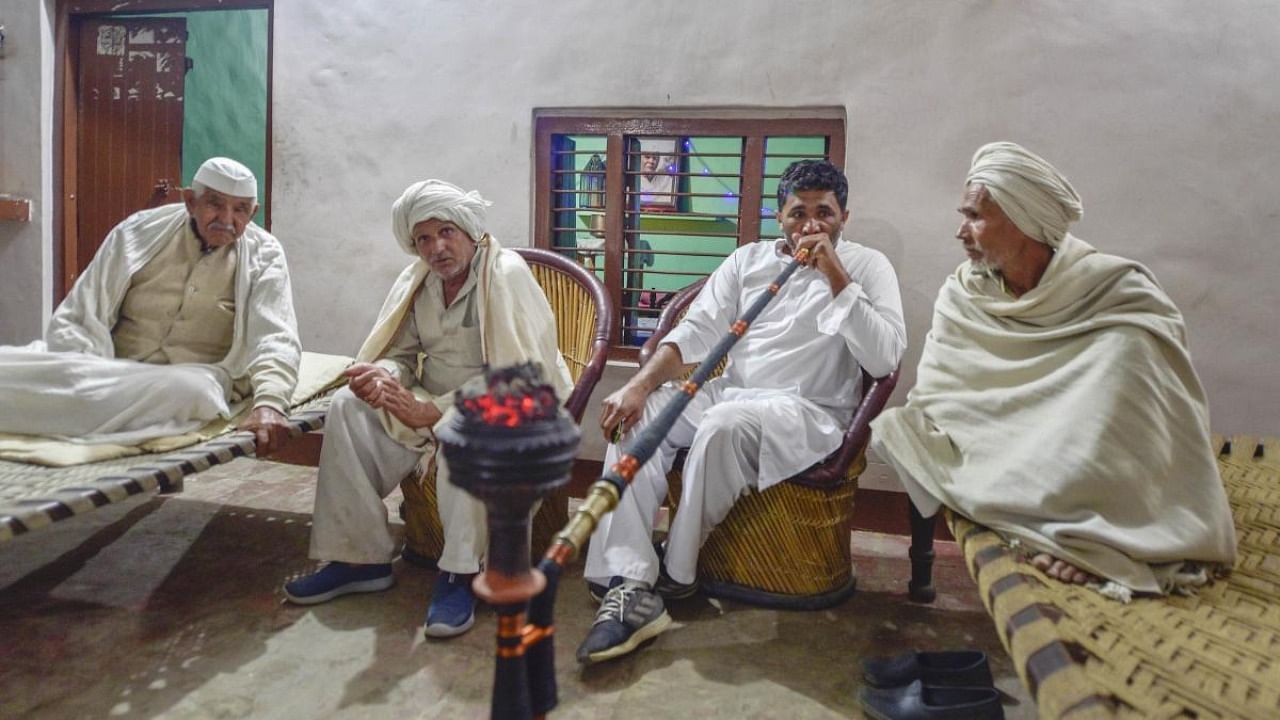
Ahead of a clarion call given by Mahendra Singh Tikait almost 34 years ago in April 1987 for farmers of Western Uttar Pradesh to protest against a proposed hike in power tariff, a 'diya' was lit at his home here as a good omen and a hookah was set in the evening as per the routine.
The agitation outside a powerhouse in Shamli soon became over-three-lakh-farmers strong and established 'Baba Tikait' as the most powerful farm leader of the region.
The family ensured the 'diya' remained lit uninterrupted as Tikait went on to lead a lot many massive protests by farmers thereafter, including an unprecedented one at Delhi's Boat Club that brought the national capital to a standstill in 1988 with over five lakh farmers laying siege to the most central part of the national capital and made the Jat leader into an iconic figure known to bring any government to its knees with the sheer number of his supporters.
It's been almost a decade since Tikait passed away, but his legacy continues and so does the 'flame' and now it is known as 'Akhand Jyot' (unbroken Flame). Also, the 'hookah' used by him is set every single evening in the room he used.
On the ground floor of a two-story house in Sisauli, a little over 100 km from Delhi, his room continues to be maintained every day by his family and a lot many of his close supporters, including those who had closely worked with him. It is this room where the 'Akhand Jyot' is placed in front of a picture of the legendary leader and it requires almost 1.25 kg of ghee every day to keep burning.
The 10X12 ft room has a single bed with a single pillow, a chair made of cane, a hookah, a plastic chair and an electric room heater, while many metal and plastic canisters of ghee lay on one side.
"The bedsheet and the pillow cover are changed from time to time, while his 'hookah' is set every evening. All the day's happenings are then stated here in this room by one of us," Narendra Tikait, the youngest of the four sons of Tikait, told PTI.
"The 'Akhand Jyot' will continue forever," he said.
There are over a dozen cattle in the house which produce enough milk to make ghee at the home itself and often people who visit the house to pay homage to Baba Tikait bring some ghee with them. The visitors are from across India but mostly from Haryana, Rajasthan and Uttar Pradesh, he said.
"But we only take one spoon of ghee from them as a mark of respect to them as we make enough ghee at our home itself," he added.
A tradition has been set where the eldest person of the family present at the home on that particular evening would sit in the room for half an hour and update 'Baba' on the day's developments relating to farmers.
"If there is any protest or movement or any major issue, we all sit here in this room and even if it's been an ordinary day, then also it is a must for at least some of us to sit in the room to follow the tradition," he said.
Many of Mahendra Singh's aides and old supporters also continue to flock to the courtyard of the house every single day, including 97-year-old Dariyau Singh, who are joined by locals to discuss anything and everything under the sun over a shared hookah as dusk sets in.
These days, the main topic obviously relates to the longest-ever farmers' protest being witnessed by the country on Delhi borders.
It is Tikait's second of the four sons Rakesh Tikait who is leading the protest against the Centre at Ghazipur border in the national capital for over a hundred days now, while the eldest of the lot Naresh Tikait, president of Bharatiya Kisan Union (BKU) founded by their father, is canvassing across the region to keep adding to the count of protestors seeking the repeal of three contentious central farm laws.
Dariyau Singh, who once served as BKU's treasurer under Mahendra Tikait and is now a tad hard of hearing, exudes faith in the farmers' capacity to fight the government's decision.
Wearing a benign smile on his face full of wrinkles, Singh points towards the source of inspiration and strength for the protests – 'Akhand Jyot'.
Thousands of farmers are camping at Delhi’s border points in Tikri, Singhu and Ghazipur with a demand that the Centre repeal three farm laws that were enacted in September 2020 and make a new law guaranteeing minimum support price (MSP) for crops.
The farmers fear the new laws would destroy their livelihoods and leave them at the mercy of corporations.
The government, which held 11 rounds of formal talks with protesting unions before the negotiations completely broke down, has maintained that the laws are pro-farmers.